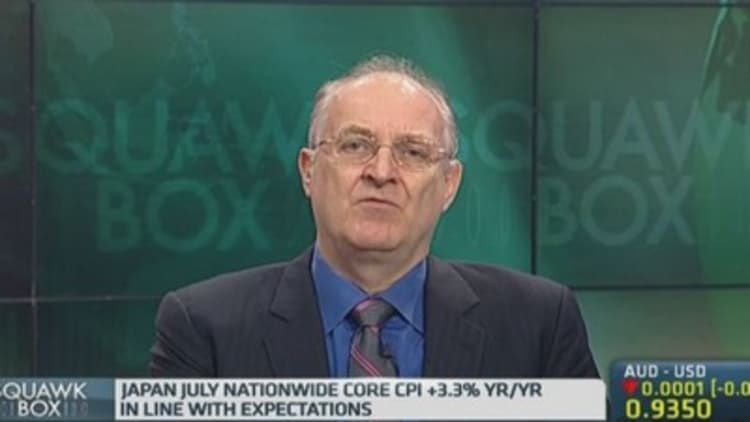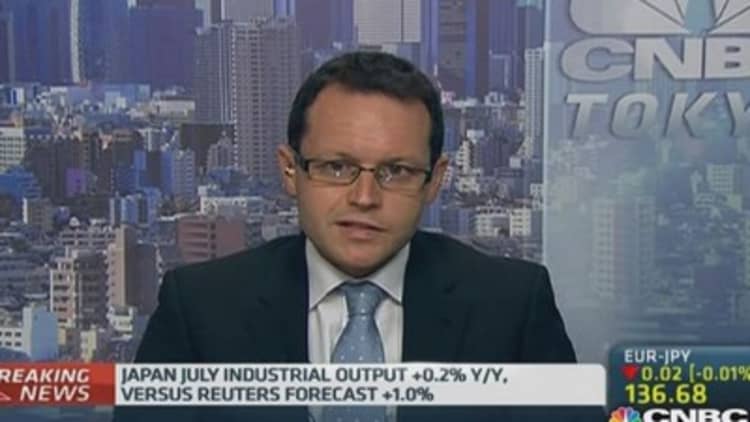
Japan released a flurry of data Friday which showed a spotty economic recovery, as the consumption tax hike in April continued to weigh on growth.
Household spending fell 5.9 percent in July from the year-ago period, much larger than the 3 percent drop forecast in a Reuters poll, and after falling 3 percent in June.
Retail sales showed a slight improvement, rising 0.5 percent on year in July, above expectations for a 0.1 percent rise in a Reuters poll, and recovering from the 0.6 percent drop in June.
Nationwide core consumer price index rose 3.3 percent in July, in line with forecasts, but when excluding the effect of the April tax hike core inflation stood at 1.3 percent in July, below the inflation target that the Bank of Japan (BOJ) pledged to meet sometime next year.
"The inflation that you're getting is just a rise in price levels associated with that tax increase so this is not really the desirable inflation that you want," said Paul Sheard, chief global economist at Standard & Poor's. "In fact, it's kind of counter-productive [in the sense that] it just eats into real purchasing power and creates a bit of a headwind for the recovery."
Read MoreJapan has fallen victim to the Keynesian scam
"The inflation that the BOJ wants to achieve is underlying inflation and that needs to hinge on the BOJ convincing people that there'll be 2 percent inflation consistently in the times ahead. In other words, the BOJ needs to work on the expectations of the public and that's harder than just jacking up the headline number with the consumption tax hike," he said.
In April, the government raised the sales tax to 8 percent from 5 percent to rein in the country's debt-to-GDP ratio, which is currently above 240 percent. It was the first tax increase in 17 years.
"It's difficult to get people out of a deflationary mindset where they always think things will be cheaper if they wait," said Nicholas Weindling, fund manager at J.P. Morgan Asset Management. "If they really believe that inflation is here to stay, they can start to buy things now. That's really what we want to see and that's what the Bank of Japan wants to see."
Other data points also reflected weakness. July's unemployment rate stood at 3.8 percent, above Reuters' forecast of 3.7 percent and up from 3.7 percent in June. The jobs-to-applicants ratio was unchanged at 1.10.
Read MoreForget Japan's shrinking economy: property looks hot
Industrial output rose 0.2 percent on month, below expectations for a 1.0 percent rise, but still better than the 3.4 percent drop in June.
"When it comes to industrial production, one of the things that some people have been disappointed by in general over the last few months is that despite the yen being weak, we haven't seen a big pickup in exports because the demand globally has not been strong as people had hoped, although the economy is definitely recovering," Weindling said.
Another issue is that some Japanese firms want to produce closer to where the end demand is, he said. "For big exporters like Japan [that means] producing overseas [and] not producing in Japan."

Japanese manufacturers forecast August output at 1.3 percent on month and at 3.5 percent on month in September, according to the Ministry of Economy, Trade and Industry.
Read MoreJapan's brokerages seize opportunity as death tax set to rise
Friday's data add to increasing calls for the Bank of Japan (BOJ) to do more to support the economy. Since the BOJ's unprecedented QE measures announced last year, the central bank has held off doing more even as data showed the economy weakening.
Annualized gross domestic product contracted 6.8 percent in the second quarter marking the largest contraction since the first quarter of 2011 following the March 2011 earthquake and tsunami, data released earlier this month showed.
"We're still seeing that now so I think it's much more important for how data looks from now on. This period may go on for another month or two... of course there may be another consumption tax hike coming up [next year] so it's important that things start to get back on track. But in terms of relatively weak data, it's largely expected. What's more important is what happens from now," he said.
The U.S. dollar-Japanese yen was little changed at 103.67 following the data. Japan's benchmark Nikkei index opened 0.3 percent lower Friday morning.

